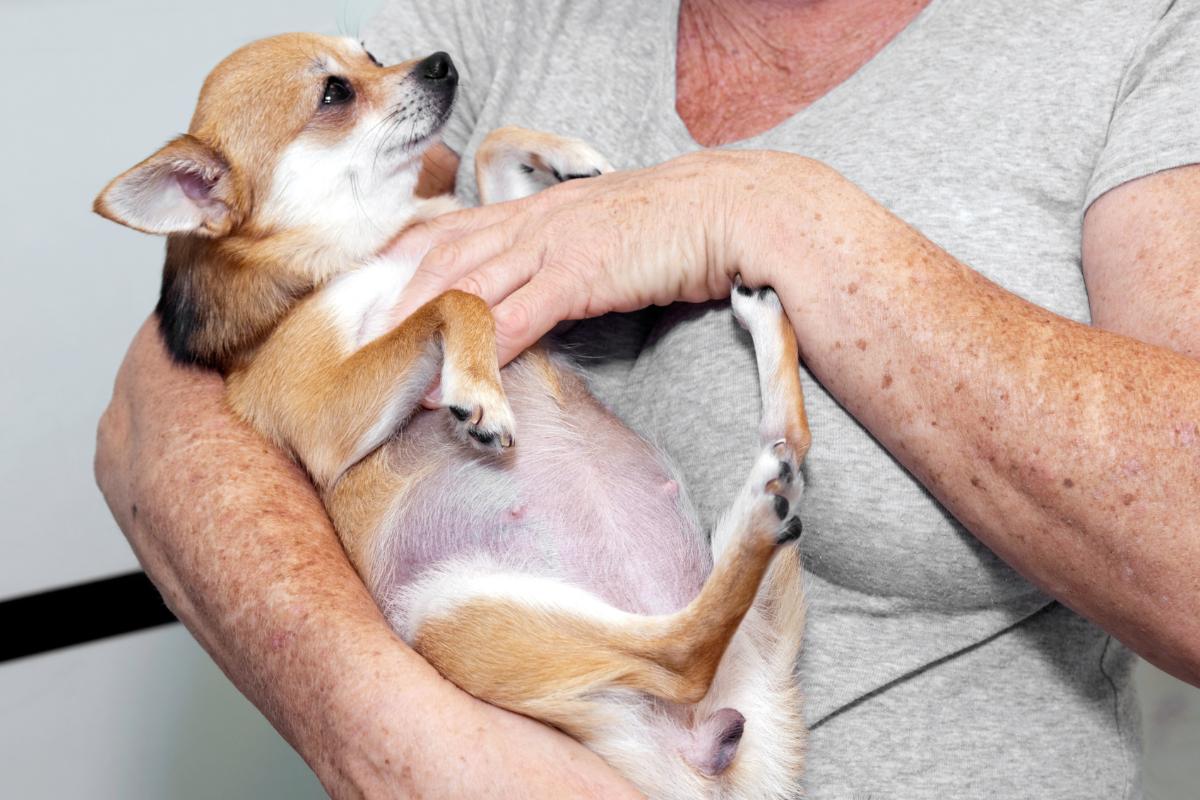Phantom Pregnancy in Dogs - Causes, Symptoms and Treatment



See files for Dogs
Also known as pseudopregnancy or false pregnancy, phantom pregnancy in dogs is a relatively common disorder in this species. It appears at the end of the diestrus cycle and is characterized by the manifestation of clinical, physical and behavioral signs. These are symptoms typical of motherhood, which include the production of milk and the raising of inanimate objects. The key difference is that the dog is not actually pregnant.
In this AnimalWised article, we discuss everything you need to know about phantom pregnancy in dogs. We look at why false pregnancy occurs, as well as what to do about it and how to prevent it reoccurring in the future.
What is a phantom pregnancy in dogs?
A phantom pregnancy, also known as a false pregnancy or pseudopregnancy, is a condition that can occur in female dogs. It is a reproductive phenomenon where a non-pregnant dog shows physical and behavioral signs of being pregnant. Some dogs may exhibit maternal behaviors towards objects or even attempt to nurse. It can be such that the dog even produces breast milk, despite not having puppies to feed.
Phantom pregnancies are believed to be triggered by hormonal imbalances that mimic the hormonal changes that occur during actual pregnancy. The dog's body prepares for pregnancy even if fertilization has not taken place. This condition is more common in dogs that have not been spayed and usually occurs about 6-12 weeks after the dog's heat cycle.
Phantom pregnancies in dogs are not uncommon, but they can cause discomfort and behavioral changes. While they usually resolve on their own, it's recommended to consult a veterinarian to ensure there are no underlying health issues and to provide appropriate care and support for the dog during this period.
Symptoms of false pregnancy in dogs
Symptoms of a false pregnancy in dogs can vary. They can be similar to those of a real pregnancy, which often makes it challenging to differentiate between the two. Some of the common symptoms of a false pregnancy in dogs include:
- Mammary gland enlargement: the mammary glands may become swollen and more prominent, similar to what happens during a real pregnancy. It is possible for an infection to occur and abnormal swelling which results in mastitis in the dog.
- Milk production: some guardians might find themselves asking why does my dog have milk, but is not pregnant? Psuedo pregnancy can
- Nesting behavior: dogs might show nesting behaviors, such as trying to create a comfortable space to give birth, even if they are not actually pregnant.
- Weight gain: it is difficult to understate how much hormonal changes can affect a dog's physical state, not only their behavior. Dogs may experience weight gain due to changes in appetite and hormonal fluctuations. This can be exacerbated if they exercise less.
- Abdominal enlargement: the abdomen might appear slightly larger due to hormonal changes that mimic pregnancy. There are various reasons why a dog's belly might be hard, so we need to speak to a vet to ensure it is actually due to false pregnancy.
- Behavioral changes: dogs might exhibit maternal behaviors, such as carrying around objects as if they were puppies or becoming protective of certain items.
- Anxiety and restlessness: some dogs may appear anxious or restless, displaying behaviors associated with a real impending birth.
- Licking and nurturing: dogs might excessively lick their abdominal area or the air, as if trying to clean puppies or stimulate them to nurse.
It's important to note that while these symptoms can be similar to those of a real pregnancy, false pregnancies do not involve actual puppies developing in the uterus. False pregnancies are caused by hormonal imbalances that trigger the body to go through pregnancy-related changes even when there is no pregnancy.

How long does a phantom pregnancy in dogs last?
The duration of a psychological or phantom pregnancy in dogs can vary from one individual to another and may last for several weeks to a few months. Several factors can influence the length of a phantom pregnancy:
- Breed: the breed of the dog can play a role. Some breeds may be more prone to experiencing longer-lasting phantom pregnancies.
- Individual variation: each dog is unique, and the duration of a phantom pregnancy can vary based on the individual's hormonal and physiological factors.
- Hormonal factors: the hormonal imbalances that trigger a phantom pregnancy can affect the duration. Hormone levels may take time to return to their normal state.
- Lactation: if a dog experiences milk production as part of the phantom pregnancy, it might continue until the hormonal fluctuations subside.
- Interventions: how the phantom pregnancy is managed can also impact its duration. Veterinary guidance and recommendations for care and management can influence how quickly the dog recovers.
- Spaying: in some cases, spaying (removing the ovaries and uterus) might be recommended to prevent future episodes of phantom pregnancy. Spaying can resolve the condition more quickly. Learn more with our article on whether spayed dogs can get pyometra.
- Stress levels: high levels of stress or anxiety in dogs can potentially prolong a phantom pregnancy or exacerbate its symptoms.
Phantom pregnancy in dogs diagnosis
Diagnosing phantom pregnancy in dogs involves observing the dog's behavioral and physical changes, as explained in the previous sections. It's essential to consult a veterinarian who will perform a thorough physical examination, discuss your observations and consider your dog's medical history to confirm the diagnosis. This examination helps rule out other potential health issues and ensures appropriate care for your dog during this period.
To diagnose pseudopregnancy in dogs, the veterinarian will perform the following tasks:
- Check medical history
- Perform a physical examination
- Assess the symptoms
- Exclude other conditions
- Use hormonal testing
- Provide imaging tests such as ultrasound
Once the dog has been properly assessed, they can confirm a phantom pregnancy. If they have not been spayed, it is also possible the dog is actually pregnant. This is especially the case if they have interacted with an intact male. For this reason, the vet will likely perform a pregnancy test.
Learn more with our article on a dog's pregnancy progression.
Can you cure phantom pregnancy in dogs?
Phantom pregnancies (pseudopregnancies) in dogs typically resolve on their own without the need for specific medical treatment. The condition usually runs its course over several weeks to a few months. As the hormonal imbalances associated with the phantom pregnancy naturally subside, the dog's symptoms and physical changes, such as mammary gland enlargement and nesting behavior, gradually return to normal.
If the symptoms are severe or causing significant distress to the dog, or if your dog experiences recurrent phantom pregnancies, your veterinarian may recommend treatment options to manage the condition. Treatment strategies may include:
- Medication: in some cases, your vet may prescribe medications to help alleviate symptoms and reduce hormonal fluctuations. These medications can help your dog feel more comfortable and less anxious during a phantom pregnancy.
- Spaying: if your dog experiences frequent or severe phantom pregnancies and you do not plan to breed her in the future, spaying (ovariohysterectomy) may be recommended. Spaying removes the ovaries and uterus, preventing future episodes of phantom pregnancy.
- Behavioral support: in cases where your dog displays anxious or compulsive behaviors during a phantom pregnancy, your veterinarian or a veterinary behaviorist may offer guidance on managing and addressing these issues.
It's important to consult with your veterinarian to determine the best course of action for your dog based on her specific situation and the severity of her symptoms. While treatment can provide relief and improve the dog's comfort, it's reassuring to know that most phantom pregnancies naturally resolve over time. The overall prognosis for affected dogs is generally positive.

Should you take toys away during phantom pregnancy in dogs?
Whether you should take toys away from a dog during a phantom pregnancy depends on the individual dog's behavior and preferences. Here are some considerations to help you decide:
Obsessive behavior: some dogs experiencing a phantom pregnancy may display obsessive nesting behaviors, which can include gathering and mothering toys or other objects. In such cases, removing toys or objects might help redirect their focus and prevent excessive nesting, which could be distressing for the dog. Learn about other reasons dogs are possessive with toys in our related article.
Comfort items: some dogs find comfort in having their favorite toys or objects with them during a phantom pregnancy. These items can provide a sense of security and comfort during a potentially confusing time.
Monitoring behavior: it's important to monitor your dog's behavior. If she is not displaying excessive nesting or obsessive behavior with toys, there may be no need to remove them.
Consult with a vet or ethologist: if you're unsure about whether to remove toys or have concerns about your dog's behavior during a phantom pregnancy, consider consulting with a veterinarian or a veterinary behaviorist. They can assess your dog's specific situation and provide guidance tailored to her needs.
Ultimately, the decision to remove or leave toys during a phantom pregnancy should be based on your dog's behavior and comfort. Observing her and seeking professional guidance if needed can help you make the best choice for her well-being during this period.

How to prevent phantom pregnancy in dogs
Finally, preventing the recurrence of false in dogs often involves a combination of management strategies. The most effective way to prevent this problem is spaying, but we present the best ways to help prevent future episodes:
- Spaying: the most effective way to prevent phantom pregnancies is to spay your dog (ovariohysterectomy), which involves the removal of the ovaries and uterus. Spaying eliminates the hormonal fluctuations that trigger phantom pregnancies. Discuss the timing and benefits of spaying with your veterinarian, especially if you do not plan to breed your dog. Learn more with our article on complications after spaying a dog.
- Behavioral support: if your dog is prone to anxiety or displays compulsive behaviors that may contribute to phantom pregnancies, consider consulting with a veterinary behaviorist. They can provide guidance on managing and addressing these behaviors, potentially reducing the risk of recurrence.
- Maintain a stable routine: keeping a consistent and stable daily routine for your dog can help reduce stress and anxiety, which may be associated with the onset of phantom pregnancies.
- Minimize stressors: be mindful of any potential stressors in your dog's environment. Avoid introducing significant changes or disruptions that could increase her stress levels.
This article is purely informative. AnimalWised does not have the authority to prescribe any veterinary treatment or create a diagnosis. We invite you to take your pet to the veterinarian if they are suffering from any condition or pain.
If you want to read similar articles to Phantom Pregnancy in Dogs - Causes, Symptoms and Treatment, we recommend you visit our Pregnancy problems category.






 My 21-month-old Anatolian is experiencing a mild pseudopregnancy -+ she's acting strange -- like a regular, domesticated dog. :-) Normally these beasts are more like a wolf than they are a golden retriever. She's actually being cuddly.
My 21-month-old Anatolian is experiencing a mild pseudopregnancy -+ she's acting strange -- like a regular, domesticated dog. :-) Normally these beasts are more like a wolf than they are a golden retriever. She's actually being cuddly.



